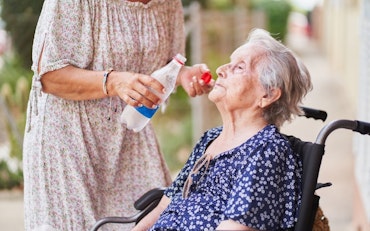New clinic to support older people with cognitive difficulties
Macquarie University in Sydney, has opened a new special health clinic that utilises doctors, clinical neuropsychologists and lawyers to assist with challenges around decision-making for older people with cognitive difficulties.
![<p>This new clinic will be able to support older people that have reduced decision-making abilities, particularly focussing on ensuring clients are supported in their decisions. [Source: iStock]</p>](https://agedcareguide-assets.imgix.net/news/articles/news/articles/Capacity-clinic-3_8_2020.jpg?fm=pjpg&format=auto&w=550&q=65)
This new clinic will be able to support older people that have reduced decision-making abilities, particularly focussing on ensuring clients are supported in their decisions. [Source: iStock]
The facility, Macquarie Health’s (MQ Health) Capacity and Capability Clinic, will be able to help people who have a loss of autonomy, either through early-stage dementia or other cognitive issues, to make sound decisions around their welfare, and financial and legal affairs.
For older people, their mental capacity comes into play for important documents around health decisions and financial and legal affairs.
It can be difficult to establish someone’s mental capacity, especially for important legal papers that require reporting involvement from doctors and lawyers, and can cause frustration and family conflict.
This new clinic will be able to support older people that have reduced decision-making abilities, particularly focussing on ensuring clients are supported with their preferences for big decisions.
Clinical neuropsychologist and Co-founder of the clinic, Dr Jane Lonie, says that nearly 30 percent of people between the age of 55 and 85 have mild cognitive impairments, which determines their ability to make legal decisions.
“The purpose of this clinic is to help patients and clients who have some level of cognitive difficulty and decision making difficulty navigate that without resorting to substitute decision making straight away,” explains Dr Lonie.
“In reality, decision making capability and capacity is really not an all or nothing thing. Typically, what we see is that [people with cognitive issues] are able to contribute to decision making at some levels but perhaps not entirely independently.
“We want to draw in the legal and medical expertise at the same time, which hasn’t been done before, it’s a first, and really help those people to remain engaged with decision making about themselves.
“We want to help people remain the driver of their decisions for as long as possible with the support that will be effective to enable them to do so.”
Older clients with cognitive difficulties can work with a lawyer and clinical neuropsychologist at the clinic to navigate complexities of reduced cognitive capacity and any legal implications for family, finances and business decisions.
Dr Lonie says it is important for clients to be able to get family and other key people on the same page for big decisions.
Care and finances of an older person can become a hotly debated topic among close family and relatives.
“We don’t want awkward and complex situations where questions around decision-making capacity can divide family members and shut off the support that’s available to the client,” says Dr Lonie.
“Where someone’s decision-making capacity is diminished for whatever reason, people can also be concerned that the legal decision or a financial decision that’s made will later be challenged and will lead to further conflict.
“We take a person-centred approach; we want to help the client to keep their will and preference as the focus of the concern.”
Dr Lonie says this clinic is also a great movement towards redefining what capacity means for an older person.
She adds that the clinic is hoping to represent itself as an early intervention process for people who have begun losing capacity.
The clinic can accept referrals directly from a General Practitioner (GP), patients, family, and supporters, as well as from community and home care services.
The clinic has found that the most common cases they see are for assessment of a person’s capacity to make decisions around their financial affairs, consent for specific medical treatment or procedures, and the appointment, or activation, of a Power of Enduring Guardianship or Enduring Power of Attorney.
Autonomy First Lawyers will be working with MQ Health at the new Capacity and Capability Clinic.
To find out more about the clinic, head to the Macquarie University’s Capacity and Capability Clinic website.










